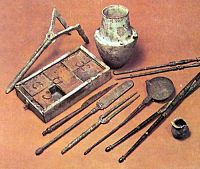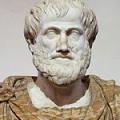35 - The Philosopher's Toolkit: Aristotle's Logical Works
Peter discusses Aristotle’s pioneering work in logic, and looks at related issues like the ten categories and the famous “sea battle” argument for determinism.
Themes:
• J. Hintikka, Time and Necessity. Studies in Aristotle's Theory of Modality (Oxford:1973).
• W. Leszl, “Aristotle's Logical Works and His Conception of Logic,” Topoi 23 (2004), 71–100.
• R. Smith, "Logic," in J. Barnes (ed.), The Cambridge Companion to Aristotle (Cambridge: 1995), 27-65.
• S. Waterlow, Passage and Possibility (Oxford: 1982).
Stanford Encyclopedia: Aristotle's logic
Elucidations podcast: Aristotle's syllogistic
On the "sea battle" problem:
• G.E.M. Anscombe, “Aristotle and the Sea Battle,” in J.M.E. Moravcsik (ed.), Aristotle: a Collection of Critical Essays, (1967), reprinted from Mind 65 (1956).
• D. Frede, “The Sea-Battle Reconsidered: a Defence of the Traditional Interpretation,” Oxford Studies in Ancient Philosophy 3 (1985).
• J. Hintikka, “The Once and Future Sea Fight: Aristotle’s Discussion of Future Contingents in de Interpretatione 9,” in his Time and Necessity (see above).

Aristotle


 ..
..



Comments
Hi Peter, With all the talk
Hi Peter,
With all the talk of Aristotle we have been doing (and I have listened to every podcast, many, more than once) I realize, as Judy Collins might say, I really don't know Aristotle at all. So, I recently purchased volume one of the Oxford translations, and started as a good 5th century student in Alexandria would with the Organon, the Categories in particular.
I really can't make head or tail of it! I am picking up the Cambridge Companion to Aristotle today, and hopefully that will help. My question is; are there modern commentaries on individual works of Aristotle that analyze what he is saying? I recognize there are many ancient commentators whom you have referred to , Alexander of Aphrodisias, Simplicius, etc. (I recently picked up an interesting Q&A by Dexippus on the Catagories)...but someone with a modern perspective must be doing this!
Any help with this "topic" would be greatly appreciated. This stuff ain't easy!
In reply to Hi Peter, With all the talk by Ferenc
Commentaries
Right, I sympathize. I think the closest thing to what you want is probably the series of commentaries on works (often single books within larger works) of Aristotle published by Oxford University Press. The series is called "Clarendon Aristotle".
In reply to Hi Peter, With all the talk by Ferenc
Pfft, who needs Aristotle when you have Avicenna?
Of course you don't really know Aristotle, he's dead. Anyway, I think your reading them in the wrong order. Start with Porphyry's Isagoge, then proceed to Aristotle's Categories, then On Interpretation, make sure to cover the Prior and Prosterior Analytics and then end with the Poetics and Rhetoric. 5th Century students in Alexandria didn't know him either so, unless your dead set on being an experimental archeologist rather than wanting to master logic, I'd start with the Isagoge, then Avicenna's chapter on logic in the Healing along with the relevant section in Remarks and Admonitions, then Teller's primer in formal logic. I'm sure there is a local nerd or autistic teenager you can visit who can explain the relevant mathematics to you but I don't think anyone will ever need to go that far, save for the aformentioned nerds and autistic teenagers. If you really want to 'know' Aristotle, your going to have to brush up on some Anthropological theory and sift through tons of boring history monographs and who wants that eh? Aristotle kinda sucks, I mean he's been studied to death to the point where it doesn't really matter if, by some magnificant feat, someone has come to know Aristotle because we've all probably got him wrong. There are plenty of fish in the sea and there are plenty of philosophers to study too, why get bogged down studying THE most studied species?
Peter---I suggest you read
Peter---I suggest you read all the various articles on Aristotle in the on-line Stanford Encyclopedia of Philosophy that was referenced above. Some of them are scholarly but they do include numerous further reading references. Most all are very good and especially stimulating for your own thinking.
In reply to Peter---I suggest you read by Otter Bob
Oops--my reply was meant for
Oops--my reply was meant for Ferenc.
Ancient Curriculum
Hey,
So you mention that Aristotelian logical works would be the first area of study in most ancient philosophy educations. I was wondering if you had a list or perhaps an idea of what the order of proceeding works would be (perhaps something like logic-epistemology-metaphysics-physics- biology-ethics-politics).
Thanks for the awesome videos!
Ben
In reply to Ancient Curriculum by Ben Cutmore
Curriculum
There was some variation in the placement of ethics - either early as preparation to become a good student of philosophy, or late and then in theory it could include all of practical philosopy, so also political philosophy. But leaving that aside it was logic, then physics, then psychology (which is actually part of physics/natural philosophy), then metaphysics.
It should be borne in mind though that there are two rival or complementary curricula. What I just described is the sequence of reading for the Aristotelian corpus, there was another sequence for Plato's dialogues (I think I talk about this in the Iamblichus episode). Sometimes they went through Aristotle and then graduated to Plato so that they had to work their way through two sequences.
By the way "epistemology" was not a discrete field of philosophy; it was covered within logic since that is where you have the Posterior Analytics.
Sea Battle
Hi, Mr. Adamson! Thank you for this podcast, and for the books! I listen to the podcast when I need to refresh on a particular subject. I was reading your chapter on the Stoics and their contributions to logic and felt the need to go back to Aristotle. One question about this episode: Why do you say that it would be implausible to say "No, you were not right because when the battle had not happened yet?". I ask because I find Aristotle's thinking on this matter sound and convincing. It seems to me that you can only speak about what is and the battle is not yet. Am I right? Help!
In reply to Sea Battle by Alejandro Otero
sea battle
Yes, I agree an easy way out is just to deny that there are truths or falsehoods about future events (except necessary ones, like "1+1=2 will still be true tomorrow"). There are downsides to this though: the most relevant one in the context of Aristotle's discussion is that in general, he accepts the principle of bivalence, namely that all meaningful assertions are either true or false. Another is that it is intuitive to say that predictions can be true or false at the moment uttered, e.g. if I now say "Donald Trump will be elected President" you would think I am saying something that is already true or false (hopefully false!).
In reply to sea battle by Peter Adamson
Thank you for responding! So,
Thank you for responding! So, in your opinion, saying that a statement about a future event is true or false does not imply that it is so necessarily, am I correct?
In reply to Thank you for responding! So, by Alejandro Otero
Future truth
Yes, exactly: just as it is only contingently (not necessarily) true that I'm now writing this, so it is only contingently true that e.g. the sea battle will happen tomorrow. This solution faced various challenges in ancient and medieval philosophy though, as I detail in later episodes. One problem was divine foreknowledge: it seems that God's knowing that something will occur means that it cannot fail to occur, which suggests that future events are necessary after all.
First figure syllogism
Hi, Peter! In the book version of this podcast, you say that the first figure is that where "the predicate of the first premise becomes the subject of the second premise," or:
A B
B C
However, most expositions of the figures indicate that it is instead:
M P
S M
I noticed that you express the premises not as "All A is B" but as "B is true of all A," so maybe that it why you express (A B / B C) the way you do? And one more question: I notice that if you change the order of the premises, the first figure becomes the fourth! Does the order of the premises matter?
In reply to First figure syllogism by Alejandro otero
Figures
As a matter of pure logic it doesn't matter what order the two premises are in but they do talk about "major" (the first) and "minor" (the second) premises and some logicians probably saw a kind of epistemic relevance there (like, I start with the major and add the minor in order to reach the conclusion).
But logically your notation is not different from mine, really: my way of writing it is to try to bring out the fact that the M term is the glue between A and B or in your notation S and P.
Here is a list of the figures, and from this you'll see that the fourth figure never involves a universal conclusion which makes it differ from the first figure barbara.
In reply to First figure syllogism by Alejandro otero
Thank you very much, Peter. I
Thank you very much, Peter. I don't know what I was thinking when I inverted the letters.
Starting Point
I have heard that one should start with the Ethics, one should start with the Organon, one should start with Physics book 2, et cetera. Where do you think one should start with Aristotle? Does one's goal/background/interests change the answer?
In reply to Starting Point by Alexander Johnson
Starting with Aristotle
Certainly your background and interests could be relevant, but all else being equal I would say the Nicomachean Ethics. It is the most readable and engaging major work and gives you a sense of how he writes (though maybe a bit misleading because it is more polished than most other treatises). Plus it is probably the work that plays the largest role in the contemporary reception of Aristotle. The ancients began teaching Aristotle with logic, in particular the Categories, but I wouldn't necessarily recommend that!
After the Ethics, reading Physics 1-2 would be a next good step, perhaps then De Anima.
Sea Battle and Your Sister
Hello, sorry for posting so much. But i was wondering on this. I read on interpretation, and at least with the Edgehill translation, Aristotle is not saying that neither is true, but rather neither is true necessarily. It is necessary that one either will or won't happen tomorrow, but not which one, and the two options are contingent, or more specificially, that one can not SAY determinitely. So on November 1st 2016, the people who said Trump will definitely win the election were not correct, because that wasn't a necessary outcome. Meanwhile, forecast models which showed trump with a 30% chance of winning were at least right in that they state that the outcome was non determinate.
The second, I don't think the example with your sister works. It is not always true that you will never have a sister. Let's say right now it is impossible for it to ever be true going forwards that you would get a sister. Well, then 40 years ago, the fact of you having a sister or not having a sister was not false, but non determinite. Thus it wasn't always true that you don't have a sister. This objection seems to stick around even with other interpretations of the sea battle arguement.
In reply to Sea Battle and Your Sister by Alexander Johnson
Two readings of De Int 9
Right, there are (at least) two ways to take Aristotle's solution. One is the so-called "traditional" reading and it states that now, it is not yet true or false that there will be a sea battle tomorrow. The other is the "non-traditional" reading and according to it, his solution is what you say: it is now true (not false) that there will be a sea battle but we don't yet know this, and the truth is a contingent one. If this is what he wanted to say, he struggled to express the idea clearly, since later ancient and medieval readers mostly seem to have taken the first interpretation. Modern day interpreters do not agree which reading is the correct one. Of course the two readings disagree about whether there could have been a truth in, say, 1800 AD that I would never have a sister: the first reading would say no (not yet either true or false), the second yes (true, but contingently so).
Essence particular
Hi, Aristotle has a fourfold distinction. What is an essential particular?
In reply to Essence particular by Essense
Essential particular
Not quite sure what you mean, but maybe you are referring to substance vs accident and universal vs particular, so that we should have (a) universal substance, (b) particular substance, (c) universal accident, (d) particular accident? If that is what you mean then examples would be for instance: (a) humanity, (b) Socrates, (c) baldness, (d) Socrates' baldness. Does that help?
In reply to Essential particular by Peter Adamson
Thank you
Thanks. It was about the distinction: said of (essential) and present in (non essential). I was trying to figure out how to have an essential non-essential.
In reply to Thank you by Essense
Said of vs present in
Oh I see. Usually "present in" is assumed to apply only to accidents. Of course accidents themselves might be thought to have essential features, e.g. red is essentially a color; but the red would be accidental to the body substance it resides in. Perhaps we could also have an "essential particular" if we think that Socrates has a particular humanity, the humanity that belongs to him alone (this is controversial among Aristotle scholars). And then this humanity would of course be essential to him.
In reply to Said of vs present in by Peter Adamson
Thanks
Thanks.
Where to even begin
Hello professor,
First of all, thank you for taking the time to provide the public with valuable insights and knowledge. You have provided a huge service to the world and I'm sure it wasn't easy to accomplish this.
I took a couple of logic classes in college and I enjoyed them, All we did was test the logical consequences of informal and formal arguments (Aristotle was never mentioned funny enough).
I didn't pursue Philosophy further but found it more and more interesting as time went on. I've been following your series and watching and then reading up on the philosophers mentioned. I even started reading Plato's dialogues, but if what you say is true, that logic comes first, then one reads Aristotle, Where would I go from there? It seems like such a daunting task (choosing a direction). I had originally thought that if I started learning from the pre Socratics from Thales, that I could follow the evolution of ideas that many of our most influential philosophers have. I thought that maybe I needed prior knowledge of those who came before in order to appreciate what more modern philosophers have written about.
Where would you recommend I begin with Aristotle, and then who do I go to next? I had no idea that Plato was advanced and I would rather not trap myself further.
Thank you
In reply to Where to even begin by Osamah Almaweri
Starting out
Well if you mean, "what should I read first by Aristotle" I would go for the Nicomachean Ethics which is the most engaging and easy-to-follow of his works (against not particularly stiff competition). And then, I don't know that you should necessarily try to read chronologically; another traditional early text for reading in history of philosophy would be Descartes' Meditations for example.
In reply to Starting out by Peter Adamson
starting out
Thank you!
How do you find the time to reply to our comments? I wasn't expecting a reply so quickly but thank you for the direction. I actually just saw a reply to someone else where you suggested further reading and I will use that as well. very excited for this section of the podcast.
In reply to starting out by Osamah Almaweri
Finding time
Well one of my favorite things about the podcast is that it puts me in touch with an audience beyond academia, so I check for comments pretty often and try to stay on top of it. Really enjoy hearing what people make of the podcast, especially when they are inspired to read further on their own like you! So thanks for writing in.
Add new comment